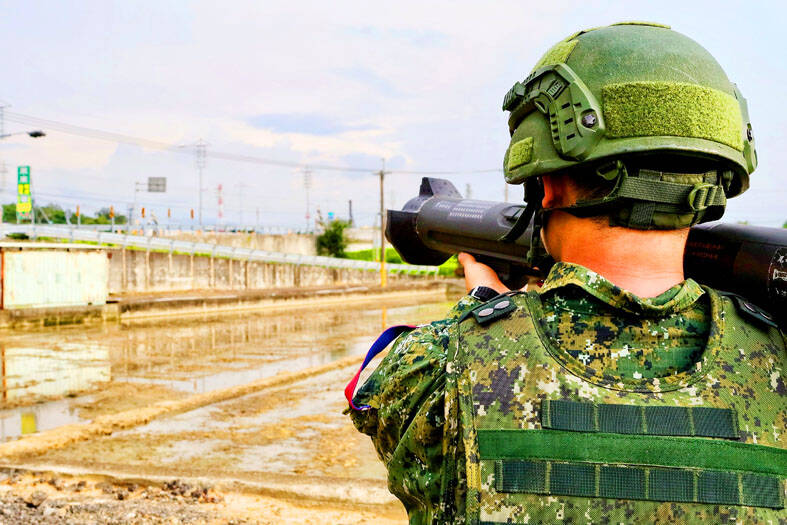The Cabinet has proposed special defense budgets totaling NT$117.6 billion (US$3.85 billion) to boost military spending beyond the limits of the general budget, amid expectations that US President Donald Trump’s administration would approve additional arms sales to Taiwan next year, experts said on Thursday.
The special budget would bring spending on defense to NT$949.5 billion, equivalent to 3.32 percent of GDP.
The NT$117.6 billion figure comprises three special budgets, including NT$7.6 billion proposed by the Coast Guard Administration. The remainder is to be earmarked under the Homeland Security Resilience Special Budget and the Foreign Military Sales Special Budget, Directorate-General of Budget, Accounting and Statistics official Hsu Yung-yi (許永議) said, without providing further details, as the budgets remain under Cabinet review.

Photo courtesy of the Ministry of National Defense
Su Tzu-yun (蘇紫雲), a research fellow at the government-run Institute for National Defense and Security Research, said the Ministry of National Defense general budget increase is limited, making the use of special budgets a natural way to meet arms procurement needs.
The special budgets could fund the production of the seven planned indigenous defense submarines, the procurement of drones from the US and local manufacturers, as well as the development of domestically made uncrewed surface vehicles, Su said.
The special budgets are likely to also include funds to purchase E-2D airborne early warning aircraft and M109A7 self-propelled howitzers from the US, he added.
Su expressed hope that the special defense budgets would prioritize domestically produced weapons — in line with the military’s Sea-Air Combat Power Improvement Plan — to stimulate the defense industry and broader economic growth.
National Taiwan University Department of Political Science associate professor Chen Shih-min (陳世民) said the sale of significant platforms such as M1A2T main battle tanks and High Mobility Artillery Rocket Systems, which Taiwan recently received, were approved during Trump’s first term.
Although the Trump administration has not announced new military sales to Taiwan, the government is confident that additional arms packages would be forthcoming and is preparing for them through special defense budgets, Chen said.
With the 2027 “Davidson window” approaching, there is a high probability that the US would sell advanced weapons to Taiwan next year, he said.
The term “Davidson window” comes from then-US Indo-Pacific Command commander Philip Davidson’s 2021 testimony to the US Congress, in which he said that Chinese President Xi Jinping (習近平) had instructed the Chinese People’s Liberation Army to be ready to invade Taiwan by 2027
Davidson’s assessment has since been reiterated by several US officials, including US Secretary of Defense Pete Hegseth.

Taiwan has received more than US$70 million in royalties as of the end of last year from developing the F-16V jet as countries worldwide purchase or upgrade to this popular model, government and military officials said on Saturday. Taiwan funded the development of the F-16V jet and ended up the sole investor as other countries withdrew from the program. Now the F-16V is increasingly popular and countries must pay Taiwan a percentage in royalties when they purchase new F-16V aircraft or upgrade older F-16 models. The next five years are expected to be the peak for these royalties, with Taiwan potentially earning

STAY IN YOUR LANE: As the US and Israel attack Iran, the ministry has warned China not to overstep by including Taiwanese citizens in its evacuation orders The Ministry of Foreign Affairs (MOFA) yesterday rebuked a statement by China’s embassy in Israel that it would evacuate Taiwanese holders of Chinese travel documents from Israel amid the latter’s escalating conflict with Iran. Tensions have risen across the Middle East in the wake of US and Israeli airstrikes on Iran beginning Saturday. China subsequently issued an evacuation notice for its citizens. In a news release, the Chinese embassy in Israel said holders of “Taiwan compatriot permits (台胞證)” issued to Taiwanese nationals by Chinese authorities for travel to China — could register for evacuation to Egypt. In Taipei, the ministry yesterday said Taiwan

Taiwan is awaiting official notification from the US regarding the status of the Agreement on Reciprocal Trade (ART) after the US Supreme Court ruled US President Donald Trump's global tariffs unconstitutional. Speaking to reporters before a legislative hearing today, Premier Cho Jung-tai (卓榮泰) said that Taiwan's negotiation team remains focused on ensuring that the bilateral trade deal remains intact despite the legal challenge to Trump's tariff policy. "The US has pledged to notify its trade partners once the subsequent administrative and legal processes are finalized, and that certainly includes Taiwan," Cho said when asked about opposition parties’ doubts that the ART was

If China chose to invade Taiwan tomorrow, it would only have to sever three undersea fiber-optic cable clusters to cause a data blackout, Jason Hsu (許毓仁), a senior fellow at the Hudson Institute and former Chinese Nationalist Party (KMT) legislator, told a US security panel yesterday. In a Taiwan contingency, cable disruption would be one of the earliest preinvasion actions and the signal that escalation had begun, he said, adding that Taiwan’s current cable repair capabilities are insufficient. The US-China Economic and Security Review Commission (USCC) yesterday held a hearing on US-China Competition Under the Sea, with Hsu speaking on